
The Dark Side of the Moon.
This drama is about how a power couple that is well matched in terms of cunning, ambition and capability scale the upper echelons of banking and finance during 1930s Shanghai. The narrative vividly captures the wild, morally ambiguous, highly speculative, wheeling and dealing nature of the mafia dominated banking and finance industries during that early period of industrialisation.Cheng Yizhi is a scrappy, enterprising, self educated young orphan with a knack for numbers and finance who is raised by a kindly shopkeeper. He starts out in a lowly position at a bank but his talent propels his rapid advancement to become the protege of banking magnate Huang Ruhong. Wu Lizi is the pampered daughter of a distinguished banker whose world falls apart when her father is framed and commits suicide. Hell bent on revenge, she marries Yizhi and ruthlessly uses his access to banking circles to investigate her father's downfall. Mutual lack of communication and a terrible, irreversible decision by Lizi ruins their marriage but leads to a very rewarding business partnership where they build a bank together.
Wu Lizi is one of the most selfish, devious, manipulative, ruthless and utterly charming female protagonists I have come across. It is such a treat to get complex and fascinating female characters like Lizi. That is why I kept watching this even though at one point I was enraged and disappointed to the point of almost dropping. I still don't like how they wrote Lizi to lash out so viciously and vindictively with such heavy consequences but I am glad I kept going because she really moved me with her stoic remorse and acceptance later on. Even though there were some rough edges to Cai Weijing's performance, overall she is tough, willful, curiously vulnerable and so charismatic that I could literally see how she tied Yizhi, Charlie and Xu Du up into knots emotionally.
Zhang Xincheng delivered a most excellent performance in this drama as Cheng Yizhi, a cynical character that well understands the dark side of the moon due to his upbringing on the rough side of town. So he is the ultimate nemesis of dark characters like Huang Ruhong because he can get into their heads and narrowly manages to stay one step head of them. In sharp contrast, he seeks the light in all of his dealings and finances some of the most promising industrialists of the day. At the onset Yizhi goes toe to toe with crooked businessmen and corrupt politicians with equally scheming and wily tactics. But as the story advances and his dark secrets are revealed, the character is whitewashed and becomes too perfect, so understanding with such shiny plated plot armor that I had to roll my eyes. I needed more flaws or to see him be a little bit petty or selfish and to play dirty sometimes. Instead Charlie, a far more interesting and lovable character rises to the occasion to do all the slightly shady things that need to be done in order to stymie their unscrupulous rivals. Nonetheless the lead couple has superb chemistry and the way their relationship blossoms from mistrust and suspicion into an incredible partnership on multiple levels is one of the drama's strengths.
The business subplots are quite interesting, well written and the financial concepts are kept at a simple enough level for laymen. The characters however are less well written and notably Lizi, is not consistently written. For such a smart character she does some retarded things that can only be put down to sloppy writing. Huang Ruhong's somewhat creepy and unfathomable hard on for Yizhe is also unconvincing and not in character for the leader of the criminal underworld. Indeed the true love triangle in this drama is the one between Ruhong, Yizhe and Lizi. This was such a promising antagonist at the start but gets sidelined as the ending arc digresses into yet another patriotic fight the Japanese invaders plot. I would have preferred to see a more satisfying cat and mouse takedown of this smart antagonist play out properly. Towards the later episodes, many key characters are gratuitously killed off to squeeze out the obligatory tears expected of a Republican period drama. This backfires as I only felt very sad for two of the deaths which only highlights that the other characters were two dimensional ones that I never got invested in.
There are many enjoyable and unique aspects to this drama that make it worth watching even though it falls down on messy plot, sloppy character writing and a lame ending arc. Charlie was my favorite character and his wit, style and wisdom saved the show. Overall this is just a 7.5 for me despite strong acting by the leads. And MVP Charlie (Wang Zijian).
Was this review helpful to you?
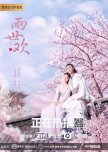
This review may contain spoilers
I will remember you, will you remember me?
This is a heart warming, unabashedly tropey love story about how true love conquers all. The OTP face a daunting obstacle: Feng Mianwan's (Chen Yuqi) mother is blamed for Jing Ci's (Yu Menglong) mother's demise. Nonetheless Jing Ci shields her from his revenge driven aunt and raises her as his companion/maid. They are childhood sweethearts but when he can no longer protect her, he finds a doppelganger, arranges for them to swap identities and doses her with an amnesia drug to forget him and their past. In her new identity Mianwan/Ah Yuan evades her (doppleganger's) engagement to the noble Mu Beiyan, dresses as a man and goes to work as a fledgling constable. In her new life, she grows into her own person and finds meaning in her existence. Her guardian angel Jing Ci joins her in a new identity as a county official and together they investigate criminal cases. They eventually stumble upon a larger conspiracy with ties to both their identities and extends to the highest levels of the empire.While this is mostly a lighthearted and fun love story, there is a sad undertone as Jing Ci's health is failing and he struggles to conceal his feelings for Ah Yuan. She does not remember him but falls in love with him all over again. His intention is to selflessly see her happily settled with someone who can expect to live a normal lifespan and who can protect her but who is he kidding? Love is never ultimately that self-less! Both characters are strong and intelligent and have an enjoyable rapport with the other couples; confidantes and allies who help them unmask their enemies and reveal the secrets of their past. I particularly liked the princess who is a fantastic and loyal friend with her own rather charming love story.
There is broad consensus that Yu Menglong's Jing Ci deserves an award for best characterization ever of a plank. Although the character is supposed to be unwell, in pain and stoic, he impressively took being plank-like to a whole new level. He has this amazingly eerie ability to seem deathly still and expressionless while speaking or in motion. Given the excoriating feedback, I feel a bit bad for the actor who clearly over-intrepretred the character and was also probably camera shy the way his eyes avoided the lens the whole time. To be fair, there were the rare one or two scenes when Jing Ci's feelings for Ah Yuan overcame him that were well acted though far from squeal-worthy. The one saving grace is he and Chen Yuqi make for a very stunning and romantic looking couple. Am a big fan of Yuqi who has really honed her acting skills and was convincing as a smart and independent minded character who knows what she wants and is not fooled or daunted by Jing Ci's seeming indifference. I really appreciate this smart and strong female lead character who is not obnoxious or dislike-able, which is more than I can say for several similarly themed 2020 releases. She is a total delight from her remarkable ability to absolutely adore her plank to her subtly comical eye rolls at Mu Beiyan's ridiculous overtures. And no, I never shipped her with Mu Beiyan - her Ah Yuan is way too capable for a dilettante and (nice) dufus like that. While Mu Beiyan is a well written, likable and much better acted character, I still find it impossible to ship a love rival who is better made up and coiffed than the female lead!
The story overall is not terribly original but the cases are interesting enough. You will not win armchair detective of the year if you spot the bad guys early on or unravel the conspiracy on your own. Some of the plot twists are a bit lazy but the characters are quite colorful and stop short of being too archetypal. The ending was well done, wraps up most loose ends and delivers a final and very satisfying coup de grace. It won't rock your world but you won't have to retreat into the fetal position to get over a gigantic slump after it ends either. I would have rated this higher (7.5/8.0 ) if Yu Menglong's performance managed to improve towards the end.
Was this review helpful to you?

Nirvana in Fire Season 2: The Wind Blows in Chang Lin
26 people found this review helpful
Closure
While NIF2 works as a superb standalone story, it is best appreciated if watched after NIF. Also be aware some of my comments may be spoilers for NIF so best not to read this if you haven't watched it.NIF2 is the story of the changing fortunes of the Changlin family as together with the Liang empire, they navigate a changing of the guard. While the story skips a generation, the ghost of Lin Shu "haunts" the drama. After all, the powerful Changlin Army is the legacy Prince Jing created in Mei Changsu/Lin Shu's memory. Xiao Tingsheng, the now elderly Prince of Changlin instills in his family the same moral values, duty, honor and loyalty that were innate to Prince Jing and Lin Shu. His sons Xiao Pingzhang and Xiao Pingjing grow up with and share a deep bond beyond blood ties with their imperial peers, especially the Crown Prince and their cousin Xiao Yuanqi. Their proximity to the throne and unbalanced power in the court is feared and envied by many. This sets the stage for political plots and intrigue at the highest levels of the court that pose many challenges for the Changlin family. This brings the free spirited and fun loving Pingjing back from the famed Langya hall to aid his more responsible elder brother Pingzhang, the heir who already shares their father's duties.
In NIF, we can only imagine what young Lin Shu's life was like. NIF2 invites us to experience being in the bosom of a close and loving family at the epicenter of power in the empire. We laugh and we cry with them, their friends are our friends, their foes our enemies, their hopes our hopes and we feel the pain of their losses in an acute and very real way. The script-writing and plot in this drama is deep and masterful in a way that rivals that of NIF. While political plotting, revenge, justice, loyalty, morality, duty and envy are still strong themes, it dives more deeply into relationships between sovereign and subject, parent and child, husband and wife and siblings and cousins while exploring the fine line between good and evil and nature vs nurture. Unlike NIF, the story does not revolve around one core character but a number of key characters. Like NIF there are many grey characters and even the good characters are very realistically written with their own strengths and flaws. These lead characters evolve over time as the story-line spans a generation shift and explores how these characters deal with change. The second half of the drama focuses on the younger generation and this is where weakness in the acting emerged as these demanding transitions are played out by younger and less experienced actors. That said, overall the cast was very strong and well populated with many veteran actors.
Newcomer Liu Haoran's Xiao Pingjing was stellarly portrayed from start to finish. He managed to "grow up" from the immature, playful, outspoken, impetuous and slightly irresponsible younger son to be a skilled pugilist, brilliant general and military tactician, the rising star of the Changlin family. This actor immediately conveyed that Pingjing must be what a young Lin Shu (whom we never met in NIF) would have been like. He is the young actor to watch coming out of NIF2. Sadly his love interest Lin Xi was played by a limited and forgettable young actress. Lin Xi's father was killed before she was born so she is an aloof character, a talented and capable lady doctor. She had to make a terrible, controversial and life altering decision in this drama. This is an awesome part that a better actress could have killed. This one wore a perpetually tragic expression and when pressed to defend her decision she overacted, wailing in a completely out of character way. There was no chemistry between Pingjing and Lin Xi and as a couple, they were not convincing. Pingzhang and his wife Meng Qianxue on the other hand were touchingly in sync with each other. Fortunately this is not a love story although there is more romance than NIF. Both female leads were strong and well written characters but only Meng Qianxue's role was well acted.
In the second half of the drama, cousin Xiao Yuanqi also comes of age, clawing his way up despite the disgrace his father (the youngest son of Prince JIng) brought on to their branch of the family. Yuanqi is a chameleon and the most interesting, complex and empathetic character in the entire drama. To be fair it is a challenging role, one that actor Wu Haochen was not up to. While his performance was technically good, it was also pedestrian and boring. He simply lacks onscreen presence and charisma. I didn't want to watch him and would either tune out or tune into whoever he was sharing the screen with. This was too critical a role for them to have miscast so badly. The character itself was exceedingly well developed, it just didn't come to life in the right way. It is why for me this drama is not a perfect 10 even though the script, plot and story-line can hold its own against NIF.
NIF broke my heart because even though Lin Shu/Mei Changsu got his justice, it was his final act. What he lost could never be recovered. I was inconsolable for a long time. Watching NIF2 was cathartic because NIF2 shows us that his legacy and everything he stood for lives on in all the lives he touched. And despite its own tragic moments, in NIF2 we get to imagine that maybe Lin Shu came back to fulfill his final promise. That gave me the closure I badly needed.
Was this review helpful to you?

Aged to perfection.
Since Love and Destiny was produced by the same team and resides in the same world, comparisons to TMOPB are inevitable. Pleasingly, the only connection is that it takes place earlier in the same 3L3W universe. This is efficient as less time is wasted on world building and explaining the tribes, hierarchies, time and other conventions. The story-line sticks to the 3L3W formula of an unforgettable love story that spans three lives and three realms. While TMOPB was an intensely passionate love story, this has more of a romantic comedy flavor. This is the story of a pure heart-ed young fairy who falls in love with the powerful and much older God of War. This relationship dynamic sets up for a different love story that again succeeds in delighting and captivating in a way that is now becoming a 3L3W brand.The plot is common for this genre (save the world or save the girl) and is this drama's biggest weakness. Those familiar with the director may observe the backstory of some leading characters (Jiu Chen, Ling Xi and Jing Xiu) were inspired by Journey of Flower - (Bai Zhihua, Hua Qiangu and Dongfang). That said, L&D is neither another TMOPB, nor JOF but a delightful story that stands on its own, albeit with a few cliche tropes. The three main arcs could have been better balanced - the first two took too long and did not leave much time for the final, most satisfying arc. There were too many (well executed) comedic fillers in this drama. This made it feel like "nothing's happening" or the relationship progressed too slowly.
The weak plot was compensated for by superb acting by the main leads. Veteran actors Chang Chen (Jiu Chen) and Ni Ni (Ling Xi) were perfectly matched. They are both gorgeous actors whose emotions and facial expressions transform and make them compelling in their appeal. The role of Jiu Chen was made for a Chang Chen that is aged to perfection - his sculpted bone structure and fierce expression exudes the aura of a stoic, mature and powerful God of War. Any suggestion that some young idol actor could have pulled this off is ridiculous. Jiu Chen is a formidable character that wears the lonely responsibility of keeping the realms safe. He moves mountains to force a win-win in his terrible conflict between duty and love. His instinct is to protect Ling Xi, to the fault of hiding the truth from her. He is alternately stern and helplessly indulgent with her. His impassive expression softens, he even smiles and becomes open and vulnerable only with Ling Xi. He is touchingly candid and unguarded when he confesses his feelings to her. With insight beyond her youth, Ling Xi recognizes the loneliness and burden inherent in Jiu Chen's role. She captivates him with her spell-blinding smile and mischievous antics; he is touched by her devotion and inept attempts to aid him. As their feelings grow, you can feel the invisible bond of their awareness and affection for each other. Ling Xi's best, most courageous moments are when she makes unbelievable sacrifices in order not to add to Jiu Chen's burdens. Each loves the other more than they love themselves.
In the first arc (20+ episodes), the Ling Xi wakes up Jiu Chen, who had been frozen for 50,000 years after sealing the Demon King. He is suspicious that such a weak fairy could have awakened him and takes her in, ostensibly to care for his health. The guileless and infatuated Ling Xi is delighted and disrupts his household with her comical attempts to entice him. She loses her senses over him and fires up his stone cold heart with her devotion. However, as God of War it is his duty to execute the young fairy with the ability to release the Demon King. Initially I found Ling Xi too subservient; a bird immortal with a bit of a bird brain. Yet Ni Ni's portrayal of Ling Xi was never annoying, indeed I was charmed despite my preference for stronger characters. She won me over when she bravely steps up to protect Jiu Chen and takes responsibility for her own life.
In the second arc (up to episode 50), Ling Xi is reincarnated as a mortal Lin Mo who has to go through three trials. She overcomes many challenges and becomes independent along the way. This is where Jing Xiu emerges as a manipulative, petty and sinister love rival to Jiu Chen. Episodes 30-40 can be skipped - this part was draggy and I struggled to empathize with Jing Xiu. This actor overacted the villain when he is actually supposed to be a grey character - he was so selfish, manipulative and creepy I was irritated at Ling Xi for not being wary of him. There were many unnecessary side characters in this arc that lingers too long on Ling Xi's coming of age. The best moments are between episodes 40-50 where Jiu Chen and Lin Mo fall touchingly in love (again). The final arc was the shortest and the sweetest. Ling Xi becomes a powerful high goddess who forces Jiu Chen to let her share his burdens and they face their enemy together.
The supporting cast was strong and there is a lovely secondary love story between Yun Fung and Qing Yao that is nicely intertwined with the primary. The villains did a decent job being evil and hateful but their motivators were typical: revenge, envy and obsessive unrequited love. The OST is very good but the CGI is quite dreadful. Overall a quality and enjoyable drama with a big budget. The bottom line remains as a love story, it boils down to the main leads. In this, they delivered - virtually all of their scenes brought a silly, lovesick and goofy smile to my face. You will enjoy this immensely if you appreciate leading actors and a love story that is truly aged to perfection.
PS - got a number of PMs re: comparison to TMOPB. I avoided directly comparing them but I also reviewed TMOPB and if you read that, what I think the differences are is obvious and reflected in the rating.
Was this review helpful to you?

Who's your daddy?
Destined is a story about how an unlikely couple discovers themselves and each other and survive turbulent times together. Liu Yuru has been auditioning all her life to be a worthy wife to the finest young gentlemen in Yangzhou. To her aghast, she finds herself engaged instead to Gu Jiusi, the scandalous scion of Yangzhou's wealthiest family. Gu Jiusi is no less dismayed to find himself shackled to such a paragon of virtue but he is chastened by his careless prank that got them in that situation. They hilariously find that they are actually well suited and the sum of their parts is greater than the whole. The first arc is by far the best; it is funny, romantic and underpinned by genuine chemistry and rapport between Song Yi and Bai Jingting.The couple's newfound bliss does not last as the country is swept into chaos as civil war breaks out. At their loss of influence in the capital, the Gu family is forced to flee Yangzhou for Youzhou far to the north. There they are still inevitably caught up in the war and ensuing political upheaval. Meanwhile, in the shadows, a hidden mastermind plots their downfall at every turn. There is a marked dark tone shift in the drama as it delves into the political arcs in the latter half. This drama explores the - "Who's your daddy?" question and whether it matters. All of the main characters have bad dads to different degrees; overly-indulgent, indifferent, overly-judgemental, negligent, wilfully blind and missing in action. Most of them are no worst for the wear but others allow their resentment to get the better of them.
This is a very entertaining drama despite that the second half is sloppily written and ridden with logic holes. The source material evidently had more substance and depth but the drama adaptation falls short on multiple fronts. The plot and character designs don’t make sense without novel readers to help connect the dots (see @CloudA’s discussion threads). The best written parts include most of Jiusi and Yuru’s arcs and humorous moments. The political arcs have too many logic gaps and farcical sub-plots that undermines the intelligence of allegedly smart characters. The writers have a very superficial understanding of history, politics and inner palace protocols. It is mystifying why the Dowager Empress does not secure the position of crown princess for her daughter in exchange for her support. Instead she uses up all her goodwill to try to foist her on a happily married man! The new emperor is so weak instead of banishing these harpies to the cold palace, he allows them free rein to bully his loyal court officials and interfere in official proceedings. He puts a known villain in charge of the crown prince's education when both Ye Sh'an and Gu Jiusi are obviously better choices. They forgot to tell us Luo Zishang has an invisibility cloak that gives him better access to the emperor's bedchamber than a favorite concubine! Game of thrones in this drama pretty means Pass the Throne (parcel). This kind of writing is why fluffy romance writers should stick to their knitting and not try to write about stuff they know nothing about.
What does make this drama work is phenomenal acting all around that papers over the lousy writing. All of the main actors are incredibly charismatic and blend into their roles so well that the portrayals surpass the character blueprints. This is especially true of Liu Xueyi's mesmerising ability to make the vicious, misguided and tragicomic Luo Zishang seem sympathetic even though his backstory and motives are not well explored and only fully revealed at the end. As a result, for most of the drama, this character comes across as a cardboard villain; a delusional sociopath that is just evil for the heck of it. Similarly Fan Yu's character evolution takes abrupt turns and his interest in succeeding his father is not well explained. Fortunately the good characters in this drama are far better written than the tired trope of villains who blame their bad behavior on their bad dads. Their motivators are not as forced and it is a lot of fun to watch the rapport, loyalty and friendships between them blossom so organically. After Jiusi and Yuru, Zhou Ye is my favorite character even though he can be a noble idiot. He just gets really hard things done and done right in the nick of time to save the day.
In the final arc, both Jiusi and Yuru are sidelined so that everyone else can do absurd things to let the villain easily get the upper hand. We are short changed of a satisfying final battle of wits between Jiusi and Zishang to make way for a very anti-climatic reveal of Zishang's backstory that devolves further into a maudlin moment of truth and reconciliation that somehow diminishes both characters.Along comes Zhou Gaolang to bravely re-take a city that was already in hand! There was a senseless, gratuitous death of a terrific character just to squeeze a few audience tears and to add insult to the injury, the perpetrator was unjustly sentenced to live the life of the idle rich. While many favourite characters got good outcomes, some of them deserve better and the final denouement fell flat and was anti-climatic This drama peaked too early at King Liang's epic siege and went downhill from there. The early arcs were an 8.5 for me but the back half was at best 7.0/7.5. Even though I can only rate this 8.0 overall, it is still a very enjoyable drama that is shored up by some fantastic acting. It is best watched tipsy or with your brain half switched off as the plot does not bear close scrutiny.
Was this review helpful to you?

The father, the son and the holy sheep.
After a long hiatus, Young Blood 2 picks up right where Season 1 left off with the team heading to Western Xia to rescue Zhao Jian's father. There they get embroiled in a plot to assassinate Yuan Hao, aka Emperor Jingzong of Western Xia. Yuan Hao was a formidable general and founder of the Tangut dynasty, which lasted almost two centuries. This narrative largely respects history so if you do not want to be majorly spoiled as to how this ends, resist the urge to Google him.Initially, Season 2's somber, pensive tone took me aback. But it is fitting for the desolate, rugged, mystical Helan Mountain terrain. It also ties well with the personal losses, betrayals, and disillusionment the team experiences at the end of Season 1. While screenwriter Wang Juan's humor and clever dialogues are evident in the writing, the difference in the directing team is noticeable. Character shots and comedic moments are not as well captured by the camera. Many of the people shots are not filmed at interesting camera angles and the main cast's humor does not flow naturally. The actors may be trying too hard to convey that some of their joie de vivre have faded after all that they've been through. Their energy often seems lethargic and their banter is lackluster despite the witty dialogue. What still shines is their unspoken affection and trust in each other which seems more mature, time-tested, and unbreakable. The "new" Yanei integrates well even though he unavoidably looks younger and is missing the swagger. Su Xiaotong's acting has most visibly improved and I enjoyed Pei Jing's growth this season.
In terms of comic relief, the antagonists steal the show in Season 2. The humor in their dialogues, the bald-faced lies traded with deadpan expressions among the Western Xia royal family had me in stitches. But it is the oddly gullible, absurdly superstitious, and unexpectedly sincere Yuchi Yuan that made me laugh hardest only to cry hardest when he admits he is someone that just needs to believe in divine intervention. Many supporting roles like Yuchi Yuan, the heroic Section 8, and the antagonists are so well written and dimensioned that they are the show stealers. Not only does Section 7's banter seem to lose its mojo, they also don't get to do the important tasks in the mission, other than show up for the finale. Indeed the main architect or spymaster is not from Section 7.
This season, most of the main characters grapple with the kind of person their father is, what he expects of them, and whether that is compatible with who they want to be. To different degrees, each parent and child take a measure of one another and don't quite like what they see. Yuan Zhongxin's dad may be a particularly nasty, cold-hearted, and misguided sociopath with questionable methods; but ultimately he wants his son to survive. This is not the case with Yuan Hao, who is the biggest, baddest, daddy of them all. Thanks to Hai Yitian's intimidating screen presence, Yuan Hao is a terrifying freak of nature, a giant rock formation that must have been hewn out of the sacred mountain itself. Just his menacing, diabolical appearance made me break out in cold sweat. Yuan Hao knows exactly what his son is up to and he gives him every opportunity, practically dares him to succeed. The dialogue within the dialogue and the dark humor behind barely veiled threats that petrifies poor Ningling Ge out of his wits is signature Wang Juan. I never felt more sorry for such a vile and duplicitous character; an apple that falls far, far from the tree. He seems diminished and less smart in Season 2, over-shadowed by the larger-than-life Yuan Hao. Father and son are both oddly pitiful to me as their story as recorded in history is already wildly dramatic and treacherous.
The plot is tighter and more focused than Season 1 because there is only one mission that spans several years with a time jump that interrupts the momentum slightly. The sub-plots are cleverly structured around the interplay of recurring themes around the father, the son and the holy sheep. At the time, the Tanguts practiced folk or natural relgion steeped in mysticism with shamans, and many spirits or gods. Like many ancient cultures, they believed that the ruler is divinely blessed but in times of chaos or natural disaster, can lose the mandate of heaven. In planning the mission, the yummy Wen Wuqi of Section 8 infiltrates Western Xia by assuming the identity of a sheep deity's envoy come to anoint Yuan Hao's regime. There are many allusions to fēngshén/封神 or the creation of gods, which is the underlying strategy the Song spies use initially to elevate and then subsequently to undermine Yuan Hao. Wang Juan's well researched and superbly written script clearly draws inspiration from Fēngshén Yǎnyì 封神演义 or The Investiture of Gods one of the great vernacular novels about Chinese history, mythology, folklore, fantasy and legends.
The ending will not come as a surprise to anyone who knows the history (or used Google). Even then, the finale delivers an epic showdown that the entire season builds up to. The fast paced and thrilling action choreography is one of the highlights of Season 2. The desperate, bloodthirsty and stunning final fight had me squealing, jumping up and down and bouncing off walls with adrenaline fuelled fear and excitement. I personally would have ended the story at the mid-way point of the final episode, where the ending credits roll. It is fitting and exactly the kind of irony, cynicism and dark humor I expect of Wang Juan. But that would have resulted in an outcry of gargantuan proportions and I equally enjoyed the final message that a father does not have to explain himself to his son. Despite the fantastic writing, I still wish the original team's chemistry worked a bit better. So for me, this was mostly tracking just a bit better than an 8.0/10.0 but I think ending a drama well is super important and I like the ending so much so I am happy to bump this up to an 8.5/10.0.
Was this review helpful to you?
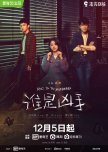
Cop out.
Despite a strong start, Who is the Murderer? deflates into yet another over-hyped and ultimately mediocre production in the 2021 Mist Theatre (soon to be known as Miss Theatre) lineup. This kind of simple and straightforward plot around the hunt for a long hidden serial killer relies heavily on good execution to impress. I don't know if it is an indictment of the competence of the Chinese police force but practically every Chinese crime thriller revolves around a stone cold case and the lamentably long road to justice.The lives of the three main characters collide when young Xiamu's foster mother is murdered by a serial killer. A fatal moment of weakness by then newbie cop Leng Xiaobing enables the murderer to escape with collateral damage. Teenage Shen Yu's father disappears without a trace after appearing near the scene of the crime. Seventeen years later, the revival of this cold case entangles Shen Yu, Xia Mu and Xiaobing, united by the scars from the past yet divided by different and at times conflicting agendas. Without a doubt all three leads deliver stellar performances as characters who all experience a shattering personal loss from this common event which shapes them in very different ways. Overall I found Xiao Yang's portrayal of the gruffly amiable but subtly guilt ridden Leng Xiaobing most natural and convincing. While both Zhao Liying and Dong Zijian delivered intense and very well acted portrayals of Shen Yu and Xia Mu, they erred on the melodramatic side with excessive posing.
One of the big issues with this drama is that the suspense does not arise from the plot itself but is heavily contrived, induced by background music that accompanies angsty and heavy dark posturing by both Xia Mu and Shen Yu that goes absolutely nowhere. While compellingly acted Xia Mu's PTSD is out of proportion to the trauma he experienced and after a lot of build up and suggestive behavior, this character just gets side-lined and he is bafflingly short changed in the final showdown even though he is on the scene. While Zhao Liying's impressive portrayal of the cold, creepily inscrutable and sociopathic Shen Yu exceeded my expectations, the plot again simply fails to rise to the occasion when it comes to her story either even though she hogs the final confrontation. At the end, I feel both characters led me on a merry chase, teasing with suggestive dialogues and actions that ultimately never fully plays out. It is very frustrating because this setup and the story could have gone down many more intriguing paths with thrilling and shocking outcomes but after setting it all up, the writer pulls a much bigger cop out on us than Xiaobing's pivotal gun shy moment.
Reminiscent of The Pavilion, the plot gets hijacked by character explorations that not only don't advance the plot, they distract from it with artificially induced suspense. This led to my greatest disappointment in the way the murderer is introduced and revealed. It completely violates the unspoken bargain of giving the viewer a sporting chance of identifying the murderer. The murderer falls far short of that lurking evil presence that creates an aura of danger around the main characters and their motive is a big yawn. This does not by any stretch of the imagination qualify as a whodunit, it is at best literally a spoiler homonym of a whodidit. Bottom line, this is little more than a very unremarkable investigative crime thriller so if you were looking forward to playing armchair detective, look elsewhere. The further extension of the mundane plot with non substantive filler episodes that introduce unnecessary characters further irritated me when I would have preferred to better understand what happened to Xia Mu's foster mother as well as Shen Yu's father. The fact that the only character I cared about was Xiaobing's (hot cop) friend at the beginning says it all about how big a fail this is.
I can only rate this a generous 7.0 out of 10. I waited to write this review because right after the ending, my very incensed mother was leaning on me not to rate this better than a 5.0.
Was this review helpful to you?
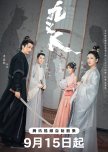
Those who seek revenge dig two graves.
This is a heartbreaking and sobering revenge drama about an ancient Me Too movenment by nine commoners seeking justice. The two main protagonists, Rulan and Meng Wan are apprentices at Yanyu Tower, whose exquisite embroidery are prized by the imperial palace. Underneath his polished and elegant facade, Yanyu Tower's proprietor and master embroiderer Wu Lian is the worst kind of predator; one who uses his power and privilege to repeatedly manipulate and abuse the young women working for him. When Rulan has the audacity and tenacity to seek legal redress, most including her bestie Meng Wan hesitate to help her; knowing how stacked the system is against them. Ultimately her plight and her conviction inspires nine people to devote their entire reason for existence to taking Wu Lian down and obtaining justice for Rulan and in some cases themselves. There are no fairytales in this drama; their stories are utterly devastating; alternately moving me to tears and making my teeth clench and my blood boil.This drama is not for the faint hearted and comes with a ton of trigger warnings. It is ruthless and brutal in terms of its scathing depiction of the unbalanced power dynamics between the powerful and the powerless. It convincingly articulates why regardless of consequences, Rulan, Meng Wan and their friends decide to take a stand against a clever, powerful and ruthless opponent. Their efforts are stymied at almost every turn and many of them pay the dear cost of justice. Wu Lian is almost too smart a villain and too well resourced. It is dismaying to see these nine avengers fall for the same traps over and over. In desperation, some of them take unnecessary risks and make terrible sacrifices with scant payoff in their attempt to gather enough evidence to indict him.
This is a large cast with consequential roles that deliver all around strong performances. Hu Yixuan's portrayal of Rulan's disillusionment, agony, bravery and forlorn quest for justice is harrowing, piteous and ultimately tragic. Wu Qian also impresses as the icily soft spoken, resolute avenging angel and mastermind of the revenge plot. As for Wu Lian, it is rare to encounter such an intelligent and downright despicable villain, masterfully acted by Qiao Zhenyu. All of the support roles come together well to paint a picture of common people from all walks of life with dreams and goals that get disrupted as they come together to get justice. The thief Li Chunfeng and the embroideress Jue Ming charmed and moved me into rooting for them most.
This kind of drama that tackles such a difficult subject matter is unlikely to appeal broad audiences. It is well executed for the most part but tends to be unnecessarily melodramatic in the later arcs. The villain origin backstory left me unmoved and is not convincing. I would expect Wu Lian's father's concubine to have impacted him in a more positive way. While this story ends in a realistic way, I am not satisfied. Wu Lian's enablers who covered for him repeatedly get off way too lightly. Finally the way this wraps up sends too strong a message that those who seek revenge dig two graves. Revenge becomes their sole purpose and end game to the extent that I wonder - did they really win? There is just too much collateral damage and sacrifice even though Humpty Dumpty can not be put together again. Maybe it would have been better to just live well. I needed to see at least one of the victims recover from this and go on to have a good life. The final What If episode 25 made me feel worse not better. I struggle with how to rate this. As much as I applaud the topic, the acting and how emotionally invested I got in the story, it left me with a hollow feeling after the ending arcs. It is still a good, thought provoking watch but I can only rate this a 7.5/10.0.
Was this review helpful to you?

If you build it they will come.
This is a story about the Chinese dream. It is vivid, it is visceral, it is unflinching, it is moving; it is about community, sacrifice and bold dreams. It is not a fairytale.As part of the government's fupin 扶贫 or poverty alleviation program, an impoverished village in Xihaigu, one of the least inhabitable regions of the land-locked Ningxia province, is to be resettled in Minning Town, a brand new settlement several hundred kilometers away on the edge of the Gobi Desert. Young Ma Defu, a fresh graduate and junior cadre member is tasked to convince the stroppy, irascible and rightly skeptical inhabitants of his home town to abandon their ancestral homes for the freaking Gobi desert!!! The hostile, savage and utterly desolate beauty of the terrain is stunningly captured in an arid, sun soaked and brilliant palette that immediately conveys the daunting enormity of the task ahead. The drama chronicles the immeasurable trials and hard won triumphs of Ma Defu and his team of dedicated experts who together with the intrepid, early settlers, had conviction that if you build it, they will come.
For a flag waving fupinju, this drama does not shy away from criticism - the sheer boldness and absurdity of the effort to tame the Gobi and how poorly planned and under resourced the initial effort was, the bureaucratic impediments, numerous setbacks and mis-steps, misguided policies, self serving and corrupt politicians are all scathingly laid bare while remaining focused on the main characters. Because first and foremost this story is about real people, mostly peasants who even when they are stupid and myopic, they are compellingly relatable - everybody has an aunt or an uncle or a neighbor or knows someone who is just like that. They are true backbone of resilience and endurance upon which the Chinese dream is built upon. This is the kind of drama that usually has me rolling my eyes, but in this case, practically every episode managed to move me to tears.
The standout character among the all-star cast of rivetingly portrayed characters is Rayzha Alimjan's haunting and inspiring depiction of Li Shui Hua, an ordinary peasant for whom the poverty alleviation program didn't come soon enough. Like many of the villagers, her name contains the character shuǐ 水 because water is such a scarce commodity that any name containing 水must bestow luck on the owner. But alas, her dreams are worth less than the price of a donkey and misfortunes befall the young Shui Hua. But this woman just rolls with the punches and nobly soldiers on, retaining a kind of inner joy, optimism and dignity that radiates from her dusty, sun burnt skin and labor torn body. When her dreams elude her, she moves on and sets and works toward new, more realistic goals. It is most fitting that the man with small vision tries to build her a well while the man with great vision builds her a dam. This is by far, the strongest, bravest, best written female character I have seen in c-drama. As for the actor, she was pretty great in Longest Day in Changan but this is her memorable, hopefully award winning performance.
As much as I enjoyed every moment of this drama, it took me an incredibly long time to watch it. This drama is not over dubbed and the characters speak a local Northwestern dialect that I initially struggled to understand and I really dislike reading subtitles. But I got used to the dialect after the first 8 or 9 episodes and after that I embraced the lively and colorful proliferation of local dialects. There were many hilarious lost in translation moments where the villagers struggled to communicate with experts from Fujian (a southern province) who were sent to help create a mushroom industry in their non-existent local economy.
If I must criticize, I think the drama is a bit too short and some of the time jumps at the end skip important moments in some of the characters' lives that I cared about, especially Defu. And I admit that the ins and outs of mushroom farming was too vivid and a bit too much information for me - I will never quite be able to enjoy mushrooms with the same relish again. That said, if the Ningxia vines are as resilient as the people, we may one day see some vintages of Ningxia wines that give their Bordeaux and Burgundy peers a run for their money.
Like most, this kind of genre is not my usual cup of tea. But this one is different - as a product of Daylight Entertainment, it is as close to a masterpiece as something of genre can be. It is marvelously well written and gorgeously shot, not at all dry or heavily bogged down by propaganda. At the same time, it really brings to life not just how China lifted 750mm people out of poverty (as defined by the World Bank) since 1990 (the beginning of this drama) but WHY they absolutely had to do it. It is an unprecedented achievement in the history of the world and this drama truly tells the story in a way that does it justice - from the perspective of ordinary people. Even though overall I rate this a 9.0, in many places and moments, it feels like a 10.0.
Was this review helpful to you?

It is twice the pleasure to deceive the deceiver.
This Chen Kaige production more than lives up to its pedigree with a fresh and intriguing plot, unforgettable characters, eye popping visuals and costumes and movie quality production values overall. It is the rare Chinese drama that delivers a hefty and completely satisfying wow factor at the end that actually exceeds the exciting, high octane start. Unlike most Republican era dramas, this one is not at all just plain depressing and yuck.On his way home, fresh graduate Hua Minchu (Oh Hao) finds himself entangled in the affairs of the Eight, a vast and powerful jianghu alliance representing eight professions or guilds (spies, sages, mechanics, deceivers, thieves, assassins, poisoners and entertainers). The Eight guild masters have been long awaiting the emergence of a new leader (their Holder) to help them "go legitimate" by disbanding and exiting the grey underworld economy to become upstanding and productive members of society. But this is easier said than done as different factions emerge and other forces plot to seize power and unlock the secrets of a fabled magnificent treasure.
This drama bursts with colorful and multi-faceted characters from the most banal to the most divine; the most loyal to the most diabolical; the most compassionate to the most deadly and the most transparent to the most deceptive. While Oh Hao's Hua Minchu is clearly the lead and very well acted, this drama is about teamwork and the entire idiosyncratic cast steals my heart. All of the guild masters are legends unto themselves; each bringing an unmatched skill to the table that complements the skills of the other masters. Both good and bad are so dynamic, bad ass and so utterly awe inspiring it is literally a gangster's paradise. I love that this drama is about a team that works together, loves together, rejoices together and mourns together - the sum of the parts is greater than the whole. It is big fun to watch such impeccably well acted character dramas like this that doesn't just focus on one lead character. That said, I must admit that Oh Hau/Hua Minchu is delicious! He is a man's man - tall, tan, charismatic and ruggedly handsome - unlike the super androgynous, pasty white faced effeminate male leads we see too much of. He is not the best fighter nor does he always make the best decisions but he is clever and dang - he is way too sexy for whatever outfit they pour him into! I watched this through what I (mistakenly) thought were gaping plot holes just to savor his effortless charm and masculinity.
The villains in this show are very good villains - just as deadly, well resourced, smart and cool . Among others, our heroes are pitted against main villain Fang Yuanji, a viciously brutal, steroid enhanced lean mean killing machine and a shadowy mastermind with an opaque agenda. I had my heart in my mouth every time the Eight engages in hand to hand combat with Fang Yuanji and all their encounters are shockingly consequential. I don't think I need to elaborate on the visual virtuosity of action scenes produced by Chen Kaige - and in truth I don't have the words to do them justice.
From the start, I saw this as a character drama and did not have high expectations in terms of plot so I was wowed when it actually delivered. The story is tightly written and the plot unfolds at an exciting pace with enough conspiracies, twists, angst, betrayals, manipulations and manifold adventures within the well constructed and engaging arcs. However, it is not that easy to develop believable romance threads within such an action packed and heavily character laden story. As such, the romance between Minchu and Xishui (Tan Songyun) was not convincingly developed and it was quite obvious that many of their scenes were cut. That said, they still had good chemistry and Tan Songyun is always adorable, she just seemed to have been dealt a bit of a raw deal on her scenes. I don't enjoy triangles generally but in this case, it is handled very well and turns out to be actually relevant to the plot. In the middle, plot holes emerged with key actors making uncharacteristic decisions that had me rolling my eyes. And then in the final two episodes, I realized I was fooled - everything makes sense and every major loose thread comes together in an EPIC showdown and an exhilarating finale that will leave you thrilled, agonized, shocked and completely and utterly pleased by the way the deceiver is deceived. This is the one drama I have seen this year with a truly strong finish and it is the way dramas should end - shortly after a thoroughly satisfying climatic peak.
Make this the next drama you start. You can thank me later. My 8.0/10 rating would be higher were it not for the cut episodes and the somewhat weaker romance arcs.
Was this review helpful to you?

One step forward for mankind and two giant steps backwards for womankind.
This romanticized account of the life story of Xiao Yanyan, the accomplished Khitan Empress Chengtian (953-1009), gives voice to folk or unofficial history of her relationship with Han Derang. Wild history of their love affair survived over a thousand years and continues to fire the imagination of Chinese historians today.Please be aware of mild spoilers ahead (unless you already know the history).
It is known that Xiao Yanyan, was once engaged to Han Derang, who was from an elite Han Chinese family loyal to the Khitan rulers. According to the drama (which is based on a novel), her father chancellor Xiao Siwen and Han Derang help Mingyi (Emperor Jingzong) ascend the throne. Mingyi is sickly and his hold onto power is thus unstable; many branches of the royal family vie for the throne. Mingyi insists on marrying Yanyan so that like both his main rivals who married Yanyan's older sisters, his wife is also of royal bloodline. This kind of ill fated romance has limited appeal to most romance watchers and is an unnecessary digression for most historical or political drama buffs.
Although I was primarily interested in the history, Tang Yan and Dou Xiao's portrayal of the young lovebirds captured my heart and I was devastated by their forced separation. But alas their chemistry fizzles out later on in the drama and leaves me unconvinced that they are soul mates whose love is as deep or as epic as folk history suggests. At face, the bare facts are tantalizing - he shores up her regency over her young son Emperor Shengzong; is her trusted confidante and is highly ranked in her court; they may even have married and had a child together and; he was likely buried besides her. But in their more mature personas, both characters just seem sad, tired and lonely and not long lost soul mates who finally have their moment in the sun. It does not help that Tang Yan appears to have an easier, more natural chemistry with Jing Chao's Mingyi. To make matters worse, there are no nuances or subtleties in Yanyan's interactions with Mingyi and Derang that suggests they mean different things to her, that her relationship with and affection for each of them is not the same.
Mingyi is the most layered, complex and interesting character in this drama and probably one of the best grey characters I have seen this year. Although I resent his manipulation, his selfishness, his obscene sense of entitlement and his disingenuous excuses for doing terrible things, I also grudgingly empathized with him and the monumental task in front of him. Jing Chao really delivers one of the most convincing portrayals of a sociopath emperor who has the audacity to steal his best friend's fiancé and yet demands and expects them to protect his legacy. Unfortunately although she delivers a few good scenes, Tang Yan fails to evoke a strong and powerful empress who can rule alongside and then after the emperor. She cannot hold onto her strong moments, just defaults back to her comfort zone of a very beautiful and feminine woman that is to be rescued and protected. Her attempts at gravitas just results in a cold, aloof empress that doesn't allow any sparks to fly; even when she is free to be with the alleged love of her life. To be fair Tang Yan was pregnant during the shooting and that put limits on her ability to do the more physically challenging scenes but she still did not have to be written to be so mopey and passive aggressive.
The other magnificently and effortless acted role is Sheh Szeman's Xiao Hunian who is everything and more of what I imagined Yanyan would be. Her portrayal of a strong, yet feminine woman who bows to duty without wallowing in self pity; who is a fierce, strategic warrior that stands up to the menacing Yansage; who does as she pleases and shows her displeasure as effectively in words as in action puts Tang Yan's meek and insipid performance to shame. When Hunian tells Han Derang that it was just a twist of fate, else she would be just as great an empress, that resonates because art imitates life; a younger Sheh Szeman would have conveyed an unforgettable Xiao Yanyan. I did not approve of how the writing undermines Hunian in the final arc - even though Sheh Szeman got more airtime and had some awesome scenes, it was just not the right thing to do to the character.
While this drama as a whole does not live up to my expectations, I found many parts of it to be riveting. The power struggles and the battle for the throne are well written and shot but the story peaks at the Yansage arc. The battle footage and strategies used to route the enemy in this arc are bloodthirsty and exciting but is too early for the climax of the drama. To some extent that cannot be helped as it is the correct sequence historically. That said, after the Yansage arc, the focus of the story should shift from internal strife to external strife rather than focus on a series of much weaker, rather pathetic attempts at coups by the least interesting characters in the drama. It does little more than to drive home how hard it is for a widowed empress to hold on to the throne as regent without a strong military backer. It does highlight Han Derang's contributions and achievements as the unsung hero and the true power behind the Liao throne.
To me this is a 7.5/8.0 but I am going with 7.5 because I expected to watch a drama about a woman warrior who chose her country over her true love and then went on to make Liao great so that her sacrifice would be worth something. Instead, I may as well have watched her get her revenge on Mingyi by doing nothing besides get fat on sweet cakes and having flings with stable boys. But I learned many things about Liao/Khitan culture, including that Khitan women were very equal and progressive - they can get divorced, remarry if widowed, lead armies, hold positions and even rule in court. Which is really ironic because Mingyi's legacy Han reforms that were among Yanyan and Han Derang's greatest achievements basically Sinicized the nomadic Liao people to their vast benefit in terms of agriculture, language, culture and administrative and legal systems. But it also set Liao women back thousands of years in terms of the status and freedom. So what our warrior empress really achieved was one step forwards for mankind and two giant steps backwards for womankind. Maybe Tang Yan's portrayal wasn't that far off...
Was this review helpful to you?

No time to die.
I have never watched a Chinese drama quite like Joy of Life. It Is pure entertainment, a heady, masculine cocktail of science fiction, political intrigue, espionage, martial arts and laugh out loud comedy. A dying young man laments his life cut short before he experiences the joy of life. He finds himself reborn an infant in another time with intact memories of the 21st century. Raised by his grandmother, this cunning, cynical know-all kid is expertly schooled in martial arts by his uncle Wushu (pun fully intended) and in medicine by a deadly poison master. Summoned to the capital by his distant father, Fan Xian sets off eagerly, anticipating the beginning of his carefree, happy existence. But his glee is short lived as someone wants to kill him dead. He finds himself saddled with a political marriage he is hell bent on squirming out of and his mother's legacy - control over immense wealth and the incredibly powerful Oversight Bureau. This is at odds with his desire to indulge in joyful pursuits and worse, catapults him right in the middle of a power struggle between two princes. Soon it appears as if everyone wants him dead. But Fan Xian literally has no time to die as he is swept away by a whirlwind of timeless secrets, murky political conspiracies, shocking betrayals and sinister encounters with opaque characters that could be friend or foe.Fan Xian is the central, core character that the plot revolves around;, there isn't really a female lead or a second lead. Fan Xian is a smart, ruthless and cunning rascal with very strong survival instincts who is not about to let anyone short change him of his second chance. His life philosophy and indifference to common inducements stymies family, friend and foe alike, leaving them at a complete loss as to how to motivate or manipulate him. Unlike his mysterious mother, a woman beyond her time, lofty aspirations like changing the world in the pursuit of social justice couldn't be further from Fan Xian's more self oriented goals. Until the world changes him when someone with joy of life shows him that there are things worth giving one's life to protect. This moves Fan Xian unaccountably, makes him do things against his nature and better judgement, it stays with him and forces him into the fray, to risk his life for what he wishes to protect. This pivotal moment and how it sparks a growing flame adds a defining dimension and substance to Fan Xian, one of the best written, most layered and entertaining characters I have come across in a long time.
This serpentine political chronicle satirizes the ruthlessness of man's ambitions and how it coincides with life's cruel and random vagaries. Most of the characters, including Fan Xian are scheming, ruthless, violent, deceitful and utilitarian. Bad things happen to good people, actions have consequences, people die, forgiveness and justice are not always possible. This underlying dark tone with its bitter notes and philosophical questions is so artfully disguised by the wit and humor that drenches this drama that it easily passes off as a comedy. The entire tone of a scene or a conversation can just shift with a bizarre interruption or a non-sequitur mundane question or digression that shouldn't even be funny but somehow is. The wit and comedy from clever word puns to baffling allusions to 21st century concepts are not merely for laughter's sake they are intended to hint at character traits, hidden motives and unspoken truths. The plot is action packed with many twists and is littered with thrilling martial arts encounters where moments of imminent peril can be unexpectedly broken by well timed comic relief.
To put it simply Zhang Ruoyun simply owns the character Fan Xian, it is unimaginable that anyone else can pull off this jaded, irreverent, manipulative and utterly irresistible rogue in such a compelling way. Even though this is not much of a romance, Fan Xian seems to have an affinity for and way with women that recalls Jin Yong's lascivious and vile Wei Xiaobao but in today's day and age, it is only acceptable that he is limited to one true love. From his hilarious sidekick the venal and wily Wang Qinian to his riotous siblings Sizhe and Rou Rou to his numerous antagonists, Fan Xian is surrounded by exceptionally well cast supporting characters that are properly fleshed out and have agency and free will. My personal favorite is of course the emperor, who is the best example how this drama dazzles with the art of the unexpected. I was completely nonplussed to see an emperor slither around in dishabille; with escaped hair tendrils and in oddly sensuous low cut nightgowns that flaunt his tanned bare chest. I was right there with Fan Xian in refusing to kowtow to such a slob and surprised he didn't have to leave a thumb or two behind as a result. Multiple clues to one of the big plot twists hide in plain site, from the oddly misplaced pieces of wardrobe and styling to the borderline goofy, eclectic 1980s subtly Latin background music. The unique and creative combination of casual (much dialed down) violence, cartoonish character traits, strange props, out of genre music, and the odd wit and humor in mundane dialogues reminds me of Tarantino, something I did not at all expect here.
This is of course just the first of three seasons. And I must admit I dropped this after 5 episodes when it was airing. I don't even remember why I didn't like it at all at the time. On my second attempt, I was addicted from the first episode and enjoyed almost every minute of it. I do think that the Bei Qi arc was not at the same level of the first arc, which set a very high bar. I was less invested in the characters in the Bei Qi arc and I found Xiao En's big reveal too long winded and his giant secret overly built up. One of the main roles in this arc is very poorly acted and noticeably several notches below the level of the rest of the veteran cast. The actor tried so obviously to be opaque and inscrutable that I pinned them as a backstabber right away. Their fixed wooden stare failed to connect with Fan Xian at any level and in several scenes I felt like Fan Xian was talking to a mannequin or to himself. This made it look like after being so smart and distrustful for so long, Fan Xian inexplicably let his guard down way too easily. Into the final moments of the last episode Fan Xian continued to be dumbed down and was pretty much thrown under the bus to force that completely unnecessary ending "shocker" that I could see coming a mile away.
The biggest drawback of this drama is of course the long wait for season 2, which still has not even started shooting as of May 2021. However, this shouldn't hold you back from watching this now due to its high rewatch value. I rate this a 9.5 for now but it has a potential to be upgraded to a 10.0 if the next two seasons deliver.
Was this review helpful to you?

An appealing lawyer.
Chen Tumi grew up studying the Tang legal code with her mother's handwritten notes. It was her only link to her dead mother. When her father is wrongly indicted for a crime, she defies convention to defend him in court. She is an appealing lawyer both literally and figuratively. Her determination, intelligence, and logical arguments catch the attention of powerful actors including Crown Prince Han Wuwei and Kang Zhengyuan of the powerful Dali Temple (judiciary). She is quietly aided by the mysterious Ye Cha.Similar to the Justice Bao stories, the legal cases in Ms. Chun is a Litigator deal largely with the common people. The cases are quite engaging and easy to follow with well-written and satisfactory outcomes. The court arguments are livened up by the amusing and friendly rivalry between Prince Han and Official Kang. While it is a bit of a Mary Sue kind of setup where everyone falls for Tumi, this funny and lighthearted quadrangle never gets annoying. Tumi is such a breath of fresh air - although she is young and inexperienced, she is clever and logical. She is able to seek and accept help without seeming weak or coming across as a damsel in distress. I am pleased to come across this very natural and charming young actress Zhang Dafei who has many interesting roles in upcoming dramas. The bromance and hilarious banter between Han Wuwei and Kang Zhengyuan is another very entertaining aspect of this drama. I checked this out because of Huang Junjie and found myself delighted and entertained by the chockfull of eye candy that makes up the charismatic young cast.
This drama's greatest shortcoming is that there are obviously many cut scenes or arcs. This affects how the larger conspiracy unfolds and leaves open some plot points. Some of the character and relationship development also feel uneven. Both Kang Zhengyuan and Ye Cha are well designed personalities that didn't get fleshed out enough. I would have liked to see Tumi interact more with Zhengyuan as he shows her the ropes in terms of judicial process. While saved by the clear spark of attraction between them, Tumi's relationship with Ye Cha seems to advance too quickly. Finally Wuwei's persona appears to take a baffling darker turn towards the end. While this wraps up well enough, there are enough unanswered questions and open plot points that beg for a second season. I would rate this higher than 7.5 were it not for the fact that it leaves a slight unfinished taste in my mouth, though not enough to ruin the drama. This drama is a lot of fun and the cast is simply a joy to watch. I am looking forward to season 2 but there is no need to wait to start this as it seems intended to be an ongoing episodic series.
Was this review helpful to you?
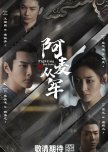
For clown and country.
Fighting For Love is a drama adaptation of a novel with the same Chinese title Ā Mài Cóngjūn/阿麦从军 or A Mai Joins the Army. The novel enjoys an impressive 8.6 score on Douban. It is a female centric story about A Mai, an orphaned noblewoman who seeks justice for her family's betrayal. She joins the army and works her way up to become a fierce and undefeated general. She discovers a greater purpose along the way, which is to defend her country. This takes place during the Northern and Southern dynasties, a period of war, chaos and political turmoil. It is not a romance and there is no real male protagonist; it is about one brave and patriotic woman's awesome journey. I abandoned the book because of its intense and graphic focus on war.Clearly the original story does not fit with the typical male-centric costume drama formula with plenty of romance tropes. What a breath of fresh air, right? Wrong. In the adaptation, Shang Yizhi is elevated to male protagonist and his story arc is as central as A Mai's. Which in and of itself, is not a terrible thing. Like A Mai, Yizhi has a hidden identity and was a victim of foul play. His cause becomes hers as she rescues him and helps him outsmart his enemies. She discovers her military prowess, forms life and death bonds with her troops and finds meaning in defending the citizens of Nanxia. They have a shared purpose and are catalysts for each other's growth. It is natural for attraction or feelings to develop between them though it does not need to be romantic.
The critical fail in the adaptation is they wrote Yizhi as a kind hearted and playful anti-hero character. While some of his comedic scenes are witty and funny, this diminishes him into a parody role. This should be a complex character who does consequential things; a once carefree young nobleman whose world changes overnight. Instead, the writers stuck him with a love brain and Peter Pan syndrome until the final arc. As he is pushed first to survive and then to reclaim his birthright, all of his motivations continue to simply revolve around A'Mai. A character that chooses each time to save the girl and let the world rot does not deserve to end up where he does! This devalues A'Mai and the Zhenbei army's achievements and sacrifices into a fight for clown and country. Even though he becomes morally ambiguous and utilitarian at the end, this evolution is too abrupt. His character progression should have begun well before he returned to the capital. Zhang Haowei did his best with this role but the character is just too poorly designed.
A Mai is quite consistently written throughout even though it is difficult to connect with her feelings for Yizhi. Even though she is too lovely to ever be mistaken for a man, Zhang Tianai does a wonderful job with the role. Her mannerisms are very masculine and she literally shakes with rage and hatred in her scenes with Chen Qi. Best of all, she is no Mary Sue in need of constant rescuing even though all the men fall for her. She just has terrible luck with men; she gets involved with a backstabber, a clown and an enemy with a choking fetish. The one good man she meets is brother-zoned, father-zoned and what happens to him is definitely over-kill. Chen Qi is the most interesting and conflicted antagonist and his and A Mai's story is really sad. Wang Ruichang is very charismatic and the fan favorite but his Chang Yuqing has no development and no real story arc. He just pops up whenever something needs to go wrong for the leads.
The first few arcs of this story are quite good and the cinematography and action scenes are pretty awesome. The story falls apart mid-way and snowballs downhill into the palace arc. It is yet another perfectly good drama that is ruined by ignorant and silly romance writers who can't write palace intrigue (i.e., Destined, Legend of Zhuohua, Wonderland of Love etc etc). This arc is ridden with predictable villains, plot holes, clichés and a flabby dancing emperor who looks like a sloppy fashion mistake. To my surprise, the story comes together again in the final episodes to end fittingly and on a strong note.
It is not easy to rate this because there are many good parts. The first 12-15 episodes and the ending is good and worth ~8 but the middle and dreadful palace arc are only worth ~6+. I think ~7.5 overall is fair but I am only going to call it a 7.0 because the production deserves to be spanked for desecrating a fantastic novel.
Scroll down for SPOILER ending thoughts.
ENDING SPOILER
The final showdown between A Mai and Chen Qi is exciting and moving and it finally gives her closure. Poor Chen Qi is such an interesting, conflicted and ultimately tragic character it is a shame he was not better fleshed out. In the end he probably loved A Mai best.
I don't believe it is in character for A Mai to go off with Chang Yuqing at the end. His feelings for her are not better developed than Yizhi's and at least in the drama, they are one-sided. He is a rising star in Beimo and if A Mai were to marry him, she would have to defect to the enemy to be another caged bird as the wife of a Marquis. After just escaping the terrible fate of being the favorite concubine of an emperor?!? As advisor Xu points out, the countries are at perfect stalemate because their top generals A'Mai and Chang Yuqing don't really want to fight each other. There is peace with them glowering fiercely at each other across the border. A Mai is simply setting off for a well earned 3-year vacation while Beimo's internal palace politics play out. It is a perfect, strong independent woman ending in the spirit of the original novel; one that says A Mai does not have to be someone's arm candy to have a meaningful life.
X
Was this review helpful to you?
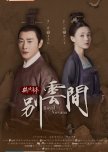
Its in their nature.
I almost didn't watch this. Although many plot threads were left unfinished, I could accept the way they left things for the main protagonists. Why not leave well enough alone? Because I still wanted to know if how things play out with Gu Fengan, Prince Zhao and Xu Changping and who does not want to see more sweet moments between Wenxi and Dingquan?There are some unexplained time gaps but these last 12 episodes are surprisingly well edited and neatly tie up all of the remaining important plot threads. What I like best is that the villain is really good, probably the best one in the entire story and he is taken down by the person he least expects. The plot is also not too convoluted nor overly mired in excessive detail so I found it easier to follow. I am also quite impressed with Zheng Yicheng's portrayal of the more mature Gu Fengan - this promising young actor needs to take on more complicated roles like this.
What remains painful is the relationship between the crown prince and the emperor - it evolves and yet is still the same. Its like watching an unstoppable force meet an immovable object. Neither can help themselves, it is in their nature. The crown prince is an amazing, uncompromising idealist with a big heart and the best of intentions but he is also a most unsuitable person for the job. He is the one person in the entire story with no free will. Everyone, including his soul mate Wenxi tries to force his hand. The outcome is inevitable and frankly, a relief.
I am glad that with this, I watched the show in its entirety. If you have already watched the first 60 episodes, I don't need to remind you that this is a beautifully written but heavy, depressing story. It is a strong finish, I give it a 9.0 although if I have to rate the drama in its entirety it is still an 8.5.
Was this review helpful to you?


 24
24 117
117 7
7














